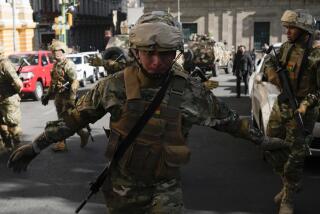Top Officers May Hold Key to Venezuela Leader’s Fate
- Share via
CARACAS, Venezuela — Although the military high command saved President Carlos Andres Perez’s life by squelching an attempted coup by rebel troops, analysts believe those senior officers now may control the fate of Perez’s political existence, endangered not just by the uprising but also by endemic corruption, worsening economic conditions and a loss of public support.
Perez and Defense Minister Fernando Ochoa were quick to note that disgruntled mid-level officers from a paratrooper brigade ordered Monday’s coup attempt, which left 78 people dead, including 16 soldiers.
Many Venezuelans returned to work Wednesday, and the situation in the capital appeared normal as the government began investigating 1,089 members of the military, including 133 officers, detained in a Caracas jail.
Senior officers, Perez insisted, stood by their commander in chief until the rebels were arrested on Tuesday. But independent observers say that, because the coup has further weakened an already vulnerable Perez, he can no longer be sure of the support of anyone, especially the military.
“An immense section of the armed forces at least sympathized with the coup leaders,” said Carlos Capriles, a Caracas newspaper and book publisher. “There is no wall separating the coup attempt from senior officers as Perez would have us believe.”
He added that Perez likely will be forced to make concessions to the military, including keeping silent about a border dispute with Colombia. He recently angered the military by pressing to resolve a dispute with Colombia over territorial waters in the Caribbean.
“The coup may have been planned before Perez’s gulf initiative,” said a history professor at Caracas’ Central University. “But Perez’s statements about the gulf were the last straw.”
That problem alone could not have caused the uprising if not combined with significant discontent of the Venezuelan people, analysts say. The coup leaders “were trying to kill Perez, knowing full well that few people here would shed a tear for him,” Capriles said.
Venezuelans, especially the middle and working classes, have suffered a drastic decline in their standard of living in the past three years of Perez’s five-year term. His economic austerity program, including privatization of state companies and fewer government subsidies, receives partial credit for helping the Venezuelan economy grow at 9.2% in 1991.
But most analysts agree that high oil prices in 1991 fueled Venezuela’s growth more than Perez’s program did. Experts predict that this year’s lower petroleum prices will slow expansion of the Venezuelan economy.
More to Read
Sign up for Essential California
The most important California stories and recommendations in your inbox every morning.
You may occasionally receive promotional content from the Los Angeles Times.













